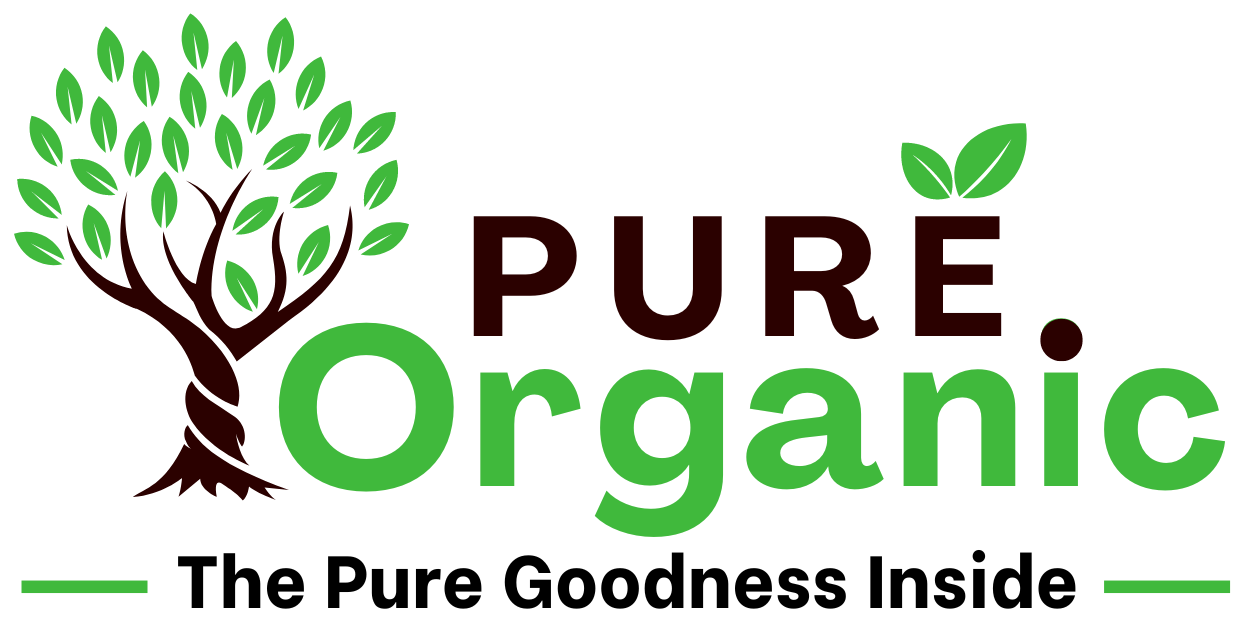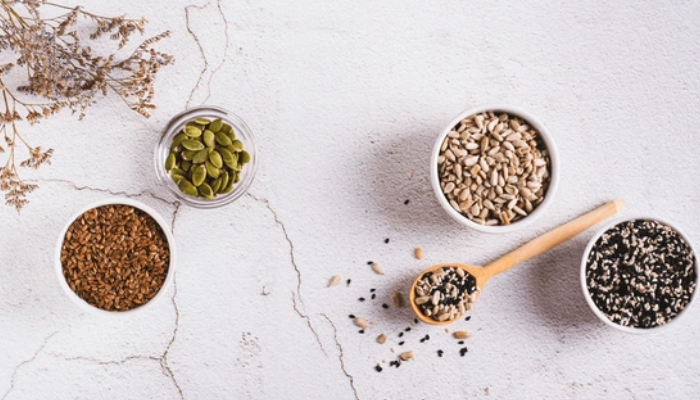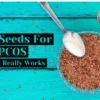How Seed Cycling Helps to Manage PCOS and Boost Fertility?
Polycystic Ovary Syndrome (PCOS) is a common hormonal disorder affecting millions of women globally, causing irregular menstrual cycles, infertility, weight gain, acne, and other health challenges. Managing PCOS can be tough, but a growing number of women are turning to holistic, natural approaches for relief. Among these, seed cycling is gaining attention for its potential to balance hormones and support reproductive health.
This article explores how seed cycling—using specific seeds like pumpkin, flax, sesame, and sunflower seeds—may help in alleviating PCOS symptoms and enhancing fertility. By balancing hormones naturally, seed cycling can offer a way to support reproductive health and even help women conceive.
What is Seed Cycling?
Seed cycling is a natural practice that involves consuming specific seeds at different phases of the menstrual cycle to help regulate hormone levels. The seeds are rich in essential fatty acids, vitamins, and minerals that support the body’s natural hormonal fluctuations. The idea is that by consuming these nutrient-dense seeds in a targeted way, you can restore balance to your reproductive system.
How Seed Cycling Works
The menstrual cycle typically has two main phases:
- Follicular Phase (Days 1-14): This is the phase where estrogen rises, leading to ovulation.
- Luteal Phase (Days 15-28): After ovulation, progesterone levels increase to support pregnancy if conception occurs.
Seed cycling focuses on eating different seeds in each phase to balance the corresponding hormones.
Follicular Phase (Day 1 – Day 14):
- Pumpkin Seeds: Rich in zinc, pumpkin seeds help support estrogen production and protect reproductive cells from free radical damage.
- Flax Seeds: High in lignans, flax seeds help balance estrogen levels and promote healthy estrogen metabolism, reducing excess estrogen.
Luteal Phase (Day 15 – Day 28):
- Sesame Seeds: Rich in zinc and selenium, sesame seeds help boost progesterone production, supporting a healthy luteal phase, which is crucial for conception and preventing early miscarriage.
- Sunflower Seeds: Packed with vitamin E and selenium, sunflower seeds support progesterone levels and protect the corpus luteum (which produces progesterone) during this phase.
Seed Cycling and PCOS: A Powerful Combination
PCOS is characterized by hormone imbalances, particularly involving estrogen, progesterone, and androgens like testosterone. These hormonal imbalances can lead to irregular ovulation, making it difficult to conceive. This is where seed cycling may be highly beneficial for women with PCOS.
1. Regulating Hormonal Imbalances
One of the key benefits of seed cycling is its potential to regulate hormones naturally. The nutrients found in pumpkin, flax, sesame, and sunflower seeds can help restore balance to estrogen and progesterone levels, two hormones that are often disrupted in women with PCOS.
- Flax seeds are rich in lignans, which help eliminate excess estrogen and prevent estrogen dominance, a common issue in PCOS. By supporting healthy estrogen metabolism, flax seeds can help improve ovulatory function.
- Sesame seeds and sunflower seeds are known to support healthy progesterone levels, balancing the ratio between estrogen and progesterone, which is vital for a regular menstrual cycle.
2. Reducing Androgen Levels
PCOS often results in elevated androgen (male hormone) levels, leading to symptoms like acne, excess hair growth, and scalp hair thinning. The lignans in flax seeds have been shown to help lower excess androgens in the body. By reducing these elevated hormones, seed cycling can help alleviate some of the most troublesome symptoms of PCOS.
3. Supporting Ovulation
One of the primary challenges for women with PCOS is irregular ovulation, or the absence of ovulation altogether. Without regular ovulation, conception becomes nearly impossible. Seed cycling may help restore ovulatory cycles by balancing estrogen and progesterone levels, improving the chances of ovulation occurring each month. Regular ovulation is essential for fertility and overall reproductive health.
4. Improving Insulin Sensitivity
Insulin resistance is a common feature of PCOS and contributes to weight gain and other metabolic issues. Both flax and sesame seeds have been studied for their potential to improve insulin sensitivity. Flax seeds contain omega-3 fatty acids and lignans, which may help reduce insulin resistance, while sesame seeds are rich in magnesium, a mineral known to support blood sugar regulation.
Improving insulin sensitivity can help with weight management, reduce the risk of type 2 diabetes, and improve overall hormonal health, all of which are crucial for managing PCOS symptoms and boosting fertility.
So, What are you waiting for? Get your Seed Cycling Kit today and begin your journey to better reproductive health!
Boosting Fertility with Seed Cycling
For women trying to conceive, seed cycling offers a natural, gentle way to support fertility. Each of the seeds used in seed cycling is packed with nutrients that promote hormonal balance, improve egg health, and create a favorable environment for conception.
1. Improving Egg Quality
Poor egg quality is often a contributing factor to infertility. The antioxidants, omega-3 fatty acids, and zinc found in seeds like pumpkin and sunflower can protect eggs from oxidative damage and improve their quality. Pumpkin seeds are especially rich in zinc, which is known to promote healthy ovulation and egg quality.
2. Enhancing Uterine Lining
A healthy uterine lining is essential for implantation to occur and for a pregnancy to be maintained. The healthy fats and vitamin E found in sunflower seeds help nourish the uterine lining, making it more receptive to a fertilized egg. Sesame seeds also contain zinc, which supports progesterone production and enhances the uterine lining during the luteal phase.
3. Regulating Menstrual Cycles
Many women with PCOS experience irregular periods, making it difficult to track ovulation and conceive. Seed cycling may help regulate menstrual cycles by promoting balanced hormone levels. With more predictable cycles, women can better track their ovulation windows, improving their chances of conception.
Seed Cycling for PCOS: A Simple Guide
If you’re ready to start seed cycling to manage PCOS and support fertility, here’s a simple plan to follow:
1. Follicular Phase (Day 1 – Day 14 of your cycle):
- 1 tablespoon of flax seeds and 1 tablespoon of pumpkin seeds daily. You can add them to smoothies, oatmeal, or salads.
2. Luteal Phase (Day 15 – Day 28 of your cycle):
- 1 tablespoon of sesame seeds and 1 tablespoon of sunflower seeds daily. Incorporate them into your diet by sprinkling on salads, mixing into yogurt, or blending into smoothies.
Note: If your cycles are irregular, you can start seed cycling based on the moon’s phases as a guide. For example, the new moon can represent the start of the follicular phase, and the full moon can represent the luteal phase.
Additional Benefits of Seed Cycling
Aside from improving fertility and managing PCOS, seed cycling offers a range of additional health benefits:
- Rich in Nutrients: Seeds are packed with essential nutrients like zinc, selenium, omega-3 fatty acids, magnesium, and vitamin E, which are crucial for overall health, not just reproductive health.
- Anti-Inflammatory Properties: Seeds like flax and pumpkin have anti-inflammatory effects, which can help reduce chronic inflammation, a common issue in women with PCOS.
- Supports Digestive Health: Seeds are rich in fiber, which promotes healthy digestion and can help manage weight, a crucial aspect of PCOS management.
- Improved Mood and Energy Levels: By balancing hormones, seed cycling may help improve mood stability, reduce anxiety, and increase energy levels—common struggles for women dealing with hormonal imbalances.
Seed Cycling: A Natural Way to Support Fertility and Reproductive Health
Seed cycling offers a natural, holistic approach to managing PCOS, balancing hormones, and boosting fertility. By incorporating pumpkin, flax, sesame, and sunflower seeds into your daily routine, you may be able to regulate your menstrual cycles, reduce symptoms of PCOS, and create a healthier environment for conception.
While seed cycling is not a quick fix, it can be a powerful part of a comprehensive plan to support reproductive health. Whether you’re looking to balance your hormones, reduce PCOS symptoms, or increase your chances of conceiving, seed cycling provides a safe and natural way to support your body’s needs.
For women struggling with PCOS and infertility, incorporating seed cycling into your routine may just be the boost your reproductive health needs, providing hope for conception and a healthier, balanced life. Start seed cycling today and take a natural step toward improved fertility and hormonal balance.
Takeaway
PCOS can feel like an overwhelming condition to manage, but seed cycling offers a simple, effective, and natural way to tackle hormonal imbalances. By aligning your diet with your body’s natural rhythms, seed cycling may offer profound benefits for women struggling with PCOS and fertility issues. Whether you’re actively trying to conceive or simply looking to regulate your menstrual cycle and improve reproductive health, seed cycling could be the key to achieving your goals naturally.







12 thoughts on “How Seed Cycling Helps to Manage PCOS and Boost Fertility?”
Pingback: ordering xifaxan generic online canada
Pingback: cheap avodart uk sales
Pingback: staxyn prices
Pingback: discount itraconazole price london
Pingback: ordering fildena canada suppliers
Pingback: generic gabapentin fast shipping
Pingback: ordering dutasteride cheap with fast shipping
Pingback: how to buy flexeril cyclobenzaprine usa price
Pingback: kamagra prescriptions
Pingback: does generic enclomiphene from canada work
Pingback: discount rifaximin purchase online from canada
Pingback: generic androxal online
You must be logged in to post a comment.